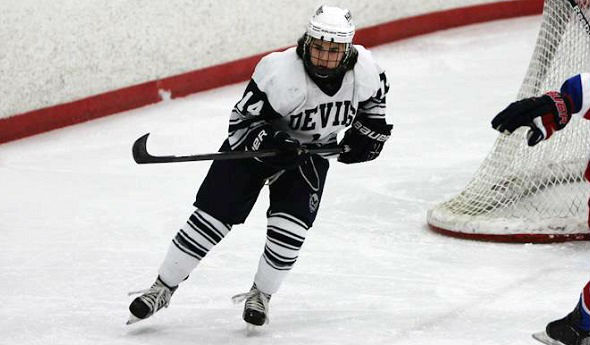
Roque Shines as Sault Ste Marie Surges
January 14, 2016
By Dennis Grall
Special for Second Half
SAULT STE. MARIE – Abby Roque has taken a somewhat unusual route to reach another high level of hockey.
 The Sault Ste. Marie High School senior, an accomplished international player on the women's side, is the only female playing on her school's boys hockey team, as she’s been each of her four seasons with the Blue Devils. She is the only girl to have ever played for the Sault, which is home to one of the top boys programs in the state.
The Sault Ste. Marie High School senior, an accomplished international player on the women's side, is the only female playing on her school's boys hockey team, as she’s been each of her four seasons with the Blue Devils. She is the only girl to have ever played for the Sault, which is home to one of the top boys programs in the state.
The Blue Devils, two-time MHSAA champions who finished second in the Division 3 playoffs in 2013 and 2014 and reached the Quarterfinals last year, are 10-4-1 this winter.
Roque, a forward who also plays on the team's top power play unit, has five goals and 14 assists. She has received a scholarship to play for the University of Wisconsin, which has one of the nation's premier women's hockey programs. The Badgers, coached by former Olympian and NHL star Mark Johnson, are currently ranked second in the country.
"It has really helped me see how college hockey will be," Roque said before a recent practice as the Blue Devils prepared for the Sault Lions Showcase this weekend and games against Dearborn Divine Child and Bloomfield Hills Brother Rice. Sault Ste. Marie is ranked No. 9 in Division 3 this week.
"It's been a good four years. It has helped me improve every single year," she added. "I've never been the best player on the team, but that has made me work hard to try to be the best player on the team.”
Last season, Roque was one of 15 girls who played on boys high school hockey teams in Michigan and earned Division 3 all-state second team honors.
She also played on the U.S. Women's Under-18 International Ice Hockey Federation world championship team that won gold in 2015.
"The speed of the guys high school game has helped me prepare for women's college hockey," she said.
While not as fast on the high school ice, Roque knows how to compensate against the boys. Asked for her primary strength, she said, "my smarts on the ice. The guys are very fast, they are very powerful. I have to make the right pass. My stick handling skills are good."
Those skills also give her a decided edge when she does play against other females, such as the IIHF world tourney, where she led the world juniors in face-offs. Even though checking is not allowed in the girls game, her experience in the more physical brand of boys hockey has helped provide a major advantage.
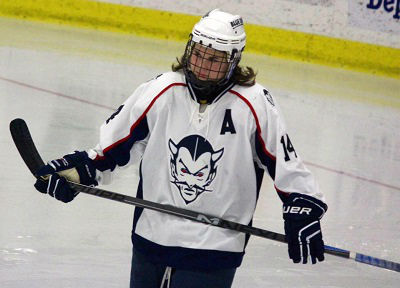 "I do enjoy the checking. The physical part of hockey is great," she said with a chuckle. "Girls hold the puck longer. Guys come at you (faster and harder) and you have to move the puck faster."
"I do enjoy the checking. The physical part of hockey is great," she said with a chuckle. "Girls hold the puck longer. Guys come at you (faster and harder) and you have to move the puck faster."
Getting knocked around in the corner in boys games is no problem. "I'm not intimidated by anyone on the ice," she said. "I've gotten stronger playing with the guys. I'm clearly not as strong, but I hold my own. It is all really just hockey to me at this point."
Her Sault coach, John Ferroni, said many opposing players and fans are not even aware there is a female on the ice. "She has definitely learned how to manage herself in the boys game," he said. "She is very competitive, sometimes even too competitive."
Indeed, she says, "I try to be the intimidating one on the ice."
That is not surprising since she has grown up with hockey a major part of her life. She began playing at age 4 and her father, Jim, is a former hockey coach at Lake Superior State University. Her uncle, Tom Bissett, is hockey coach at Grand Rapids Forest Hills Northern.
"If kids inherit things from their parents, she has inherited her dad's hockey IQ. She picked up the sport and has had a lot of hockey conversations with her father, and she comes from a hockey family," Ferroni said, noting her mother also has a strong athletic background.
Roque, who also has played golf and soccer and boasts 4.0 grade-point average taking advanced placement classes, said playing boys hockey was not a hard decision. She played in the strong Sault boys youth program from day one and realized the boys were the direction to take after playing girls hockey in the fall as an eighth grader.
"She always played with good hockey players, and they always accepted her as a girl," said Ferroni, in his fifth year as Sault coach. He said Roque "understands the game real well and made the commitment a long time ago. She is very dedicated to the sport."
Ferroni said Roque "has decent speed and decent quickness at the boys level. She is a strong skater and is very hard to knock off the puck. She is very elusive and always seems aware of what is going on around her."
That ability to see the game makes her "a playmaker without question" according to Ferroni. "She passes the puck extremely well; she has good, strong passing skills."
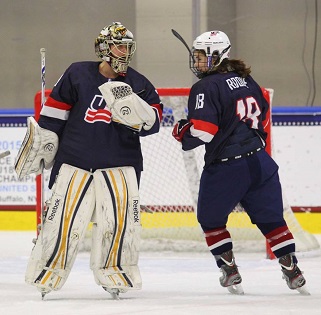 Ferroni admits he "had to look at a lot of things before taking her" on the team. After that process concluded, he said, "I knew she would be fine, but no way did I think she would rise to the level she has risen to. I didn't see that (second team all-state) coming."
Ferroni admits he "had to look at a lot of things before taking her" on the team. After that process concluded, he said, "I knew she would be fine, but no way did I think she would rise to the level she has risen to. I didn't see that (second team all-state) coming."
After checking out girls programs, Roque and Ferroni realized the Sault High School boys team would be the best path to follow. Ferroni said playing against other girls was not fast enough, and the puck movement among the boys was much better.
"We afforded her and gave her a great opportunity," Ferroni said. "She walked into a good, strong program as a freshman and was not just being a player, but was a real solid player. She definitely has raised the bar around here for girls.
"She has helped us as much as we have helped her."
Roque said Wisconsin "was the right fit for me. I loved everything about it, about Madison. Everything is about hockey. I just couldn't go anywhere else."
Roque also received scholarship offers from women's programs at North Dakota, Boston College and Boston University, among other schools.
This school year's participation figures will not be compiled until the spring, but about 250 girls total played on MHSAA boys teams in 2014-15.
 Denny Grall retired in 2012 after 39 years at the Escanaba Daily Press and four at the Green Bay Press-Gazette, plus 15 months for WLST radio in Escanaba; he served as the Daily Press sports editor from 1970-80 and again from 1984-2012. Grall was inducted into the Upper Peninsula Sports Hall of Fame in 2002 and serves as its executive secretary. E-mail him at [email protected] with story ideas for the Upper Peninsula.
Denny Grall retired in 2012 after 39 years at the Escanaba Daily Press and four at the Green Bay Press-Gazette, plus 15 months for WLST radio in Escanaba; he served as the Daily Press sports editor from 1970-80 and again from 1984-2012. Grall was inducted into the Upper Peninsula Sports Hall of Fame in 2002 and serves as its executive secretary. E-mail him at [email protected] with story ideas for the Upper Peninsula.
PHOTOS: (Top) Sault Ste. Marie's Abby Roque positions herself near the net during one of her team's games. (Middle) Roque is the first girl to play on the Sault's boys hockey team. (Below) Roque, here on her U.S. Under-18 team, brings international experience to the high school season. (Photos courtesy of the Sault Ste. Marie athletic department.)

Hockey Players Transferring Winter Puck Skills to Spring Golf Swings
By
Tom Lang
Special for MHSAA.com
May 26, 2023
When the Michigan seasons shift from winter to spring, some high school golf teams are a little more eager than others for the hockey season to officially end.
This is especially true for the school golf programs in Brighton, Hartland and Muskegon Mona Shores – examples of boys teams that love having hockey players transition from the indoor frozen ice to play golf outdoors on the lush green grass.
“I would take a golf team full of hockey players any day,” said Hartland golf coach Nathan Oake. “I love them.”
We can tell, because his program is full of them.
Hartland and Brighton each have eight hockey players on their 16-golfer varsity and JV rosters.
Mona Shores has three hockey players this year, but usually has more. In 2023 it’s Oliver MacDonald (all-state honorable mention in hockey), Nathan McNarland and Nicholas Taylor, who was voted Division 1 all-state golf last spring, then leading his team to fifth place at the MHSAA Lower Peninsula Division 1 Final.
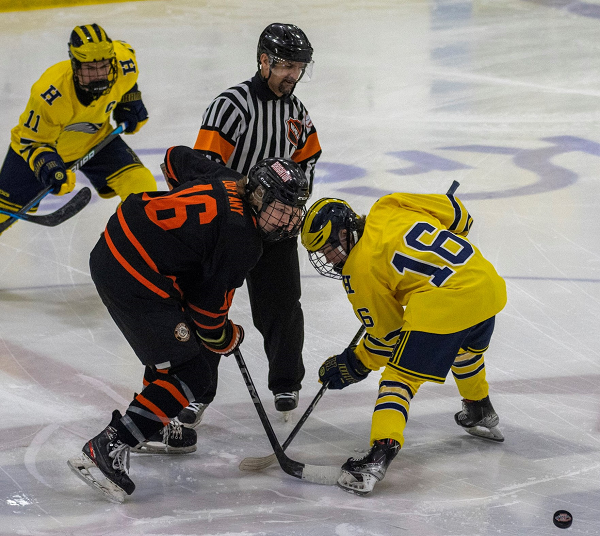 Brighton golfer Winston Lerch was also Division 1 all-state last year in golf and an assistant captain on the hockey team this winter that finished Division 1 runner-up to Detroit Catholic Central. Here in 2023, he shot a 65 to open the season at Oakland University for medalist and has committed to Grand Valley State for golf with his 72-stroke average.
Brighton golfer Winston Lerch was also Division 1 all-state last year in golf and an assistant captain on the hockey team this winter that finished Division 1 runner-up to Detroit Catholic Central. Here in 2023, he shot a 65 to open the season at Oakland University for medalist and has committed to Grand Valley State for golf with his 72-stroke average.
Joining Lerch in the Bulldogs boys golf program are hockey players like Levi Pennala, winner of hockey’s Wall Award sponsored by State Champs as the top high school goalie. Pennala – who recently shot 72 at the Kensington Lakes Activities Association championship tournament, his career low for high school golf – finished in the top 30 last year at the LPD1 Final. Then early this spring when he was away at a high-level junior hockey tournament, freshman hockey player Adam Forcier stepped in and shot a school record 18-hole round for a freshman at 73. Jacob Daavetilla also works into the starting lineup at times.
Forcier tied the record of Davis Codd – who, as a pro hockey player on leave from the Saginaw Spirit OHL hockey team when COVID-19 shut down the league, won the LPD1 Final in 2021 for Brighton.
Brighton golf coach Jimmy Dewling said Codd was one of the earliest to prove to others you can play both hockey and golf and excel. In fact, that June in 2021, Codd went to an NHL scouting camp in Pennsylvania before the Golf Finals, drove overnight back to Forest Akers to play the two championship rounds, won the title, then immediately returned to Pennsylvania to resume the hockey camp.
“On our team, we believe, and TBone (Codd) was a perfect example of it, if there’s any time you have the opportunity to be competitive, it is going to make you a more well-rounded competitor and therefore better at your particular sport,” Dewling said.
“We like hockey players. In the winter, they have to think to where the puck is going, be smart enough to react, and understand how that emotion is going to carry over from one play to the next. When it’s your shift you have to forget about the last shift, or take something from the last shift and put it into the next shift, to have consistent play.
“It’s the same on the golf course,” Dewling continued. “It’s one hole to the next, one shot at a time, being tough, and that’s only going to come from competition reps. We love the athletic ability more so than anything; the toughness and competitiveness all year.”
In addition to Lerch and Pennala starting on varsity golf, they are joined by traditional golfers Matt Doyle, Riley Morton and Andrew Daily, who is committed to Wayne State and finished LPD1 runner-up last spring.
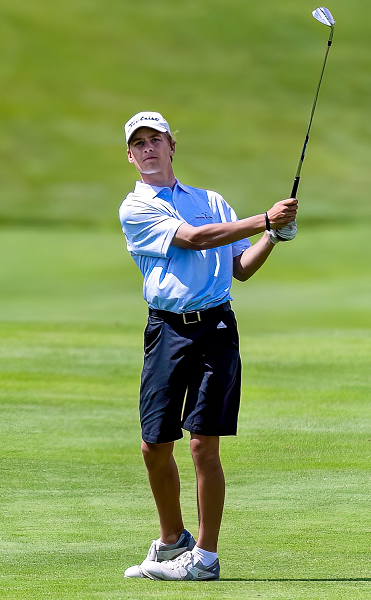 Going into the 2023 golf postseason, Brighton is ranked No. 2 in Division 1. The Bulldogs have won the Next Tee Invite at Oakland Hills, the North Star Invite at Plum Hollow and the KLAA Conference Championship – earning Brighton’s first conference title since 2007. The Bulldogs also were runners-up at The Meadows Invite at Grand Valley State University. The team is averaging 297 for 18 holes.
Going into the 2023 golf postseason, Brighton is ranked No. 2 in Division 1. The Bulldogs have won the Next Tee Invite at Oakland Hills, the North Star Invite at Plum Hollow and the KLAA Conference Championship – earning Brighton’s first conference title since 2007. The Bulldogs also were runners-up at The Meadows Invite at Grand Valley State University. The team is averaging 297 for 18 holes.
Oake admitted this is a rebuilding year for Hartland’s golf program. The varsity lineup has only two returning players with varsity golf experience – Keller King and Brady Betteley.
“So, we opted to keep a group of tough competitors with a solid combination of speed and strength – and who are not concerned about the cold conditions that we play in,” Oake quipped.
Five others rotate into the Eagles’ golf starting lineup with King and Betteley: Isaac Frantti is an all-state hockey defensemen playing his first season of golf but shot a career-low 79 at American Dunes recently. He just signed a United State Premier Hockey League tender to play in Connecticut next year. Ian Kastamo scored the winning goal in Hartland’s Division 2 hockey championship victory in 2022, and LJ Sabala is a varsity hockey player as well.
Then there are two non-hockey freshmen getting shots to start occasionally – Dallas Korponic, who finished third at his weight at the Individual Wrestling Finals, and Michael Maurin. Five more sophomores and juniors are hockey players on the JV golf team.
“We hope to be competitive with (Brighton) again soon, but they have the talent to make a big splash this year,” Oake said. “I also play golf at the same club as many Brighton players, so I see them quite a bit and we are friendly. When the Brighton team walked by our team on a recent Monday and all said hello to me and our guys, one of my players looked at me and said that this was the biggest difference between hockey and golf. In hockey, the small talk would be (traded) for the ice, and it would not be very nice out there.
“Either way, I believe both sports are filled with fierce competitors and respect, but when the game is over a handshake and a golf hat tip are offered to the victor.”
This story was updated and reposted with permission of MIGolfJournal.com.
PHOTOS (Top) Brighton takes a team photo after finishing third at last season’s LPD1 Final, and all five golfers are back this season including hockey players Levi Pennala (second from left) and Winston Lerch (second from right.) (Middle) Hartland’s Ian Kastamo (16) takes a faceoff against Brighton this winter. (Below) Mona Shores’ Nicholas Taylor fires an iron shot. (Photos courtesy of High School Sports Scene, Sapshots Photography and Mona Shores’ athletic department, respectively.)

